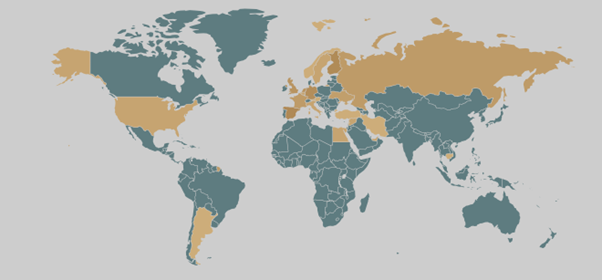Religion and environmental sustainability on the EARS dashboard
Religion and environmental sustainability on the EARS dashboard
Sustainability, the environment, and their connection to religion are being widely discussed. Explore the EARS dashboard for insights on this topic.
The EARS dashboard
The EARS dashboard offers users a unique platform to delve into the intricate relationship between religion and society in Europe. Our team of analysts has curated almost 2,000 concise summaries of impactful news stories from European media sources over the past year. By harnessing the power of the dashboard, individuals can uncover valuable insights into the prevalence of diverse themes. Furthermore, they can explore the interconnectedness of these themes with other subjects, and gain a deeper understanding of their relevance to contemporary global events.
In our news summaries, the recurring themes of sustainability and the environment have revealed a close connection to the realm of religion. Moreover, the relationship between sustainability, the environment, and religion has garnered considerable attention as an area of study. This intricate interplay between these domains explores the intersection of religious perspectives and practices with the urgent challenges of sustainability and environmental stewardship in our modern world.[1]
In the past 12 months, the term Sustainability & Environment has been tagged in 78 article summaries on the EARS dashboard. By checking the ‘countries’ tab on the dashboard, we can observe that this tag has been used to categorise articles that cover different European countries. But which thematic fields are interconnected with it? Let’s take a closer look.

Religious perspectives on nature and creation
Many dashboard summaries demonstrate that religious traditions frequently encompass teachings and beliefs that emphasise the sacredness of nature. Moreover, they emphasise humanity’s responsibility to safeguard and conserve the environment. For example, the summary Would Jesus have also demonstrated? Religious education for sustainable development from May 2023[2] and the article published by EARS titled Greening the Divine: Can religion help protect the environment from May 2023[3] explore these connections. Indigenous religions, for example, recognise the spirituality inherent in nature, while monotheistic faiths emphasise the concept of stewardship and the divine mandate to care for the Earth.[4] These religious perspectives serve as a basis for promoting sustainable practices and cultivating environmental awareness, as exemplified by the dashboard summary The Pope quotes Saint Francis of Assisi: Praise be to you, Lord, for our sister Water… from March 2023.[5]
Religious rituals and practices often include elements that nurture a strong bond with nature and the environment. Through ceremonies conducted in outdoor settings or sacred natural spaces, a profound spiritual connection between humans and the natural world is reinforced.[6] [7] As an example, the dashboard summary French peasants hope to beg for rain with relic procession from March 2023[8] could be mentioned. Such rituals not only show the individuals’ deep appreciation for the environment but can also reflect a sense of responsibility to protect it.[9]
Ethical imperatives and environmental activism
As the dashboard shows, many religious teachings include ethical imperatives that guide adherents to live in harmony with nature and practice responsible stewardship. Principles of compassion, justice, and interconnectedness, which are central to various religious traditions, offer a robust ethical framework for addressing environmental issues. View for example the dashboard summary It is better for Christians not to eat meat, declares pastor Kari Kuula – the church has no official guidelines for meat consumption or production from June 2023.[10] By promoting sustainable behaviours and advocating for environmental justice, religious communities can contribute to the broader movement for a more sustainable world.[11]
Religious communities have actively engaged in environmental activism, advocating for policy changes, and mobilising resources to address ecological concerns.[12] Additionally, interfaith collaborations have emerged as powerful platforms for fostering dialogue, sharing best practices, and pooling resources to collectively tackle environmental challenges. These initiatives exemplify the transformative potential of religious communities in driving sustainable change.[13]
Education and awareness
Religious institutions such as churches, mosques, and temples serve as important educational platforms to raise awareness about the environment and promote sustainable living. They achieve this by incorporating environmental themes into sermons, offering religious education programs, and participating in community initiatives. Through these efforts, they disseminate knowledge, inspire action, and encourage individuals to adopt eco-friendly practices in their daily lives. A noteworthy illustration of this is the dashboard summary titled Kirchentag as a climate protection pioneer for major events from May 2023.[14]
The close relationship between sustainability, the environment, and religion emphasises the need for a comprehensive and multidimensional approach to tackle ecological challenges. Understanding the interconnections between religious beliefs and sustainable practices can bring about profound changes in how we perceive and care for the natural world. In this regard, individuals and religious communities have both the opportunity and the obligation to play a significant role in promoting a more sustainable future. By embracing their shared responsibility for environmental protection, they can contribute to building an environmentally conscious world that coexists harmoniously with nature.[15]
Learn more on the EARS dashboard
The EARS dashboard allows you to gain insights into many topics, including those described above. It is a free tool that allows you to make connections like those described above, and to find out about relationships between interesting subjects across Europe. Please visit the dashboard to learn more.
Our team of analysts conducts research on topics relating to religion and society. Find out their relationships on the EARS Dashboard.
Sources
[1] Nachhaltigkeit und Schöpfung
[2] Hätte Jesus mitdemonstriert? Religiöse Bildung für nachhaltige Entwicklung
[3] Greening the Divine: Can religion help protect the environment?
[4] “Religion kann zu Nachhaltigkeit motivieren”
[5] Le pape cite saint François d’Assise: « Loué sois-tu, Seigneur, pour notre sœur Eau… ».
[6] Wie und warum entstanden religiöse Kulte und Rituale?
[7] Religiöse Erziehung: Die drei Rituale für den Alltag
[8] Franse boeren hopen regen af te smeken met relikwieënprocessie
[9] Der Kölner Dom und die Bewahrung der Schöpfung
[10] ”Kristityn on parempi olla syömättä lihaa”, julistaa pastori Kari Kuula – kirkolla ei ole virallisia ohjeita lihankulutukseen tai tuotantoon
[11] What is the relationship between religion and environment?
[12] From wars to climate change: World religions and global challenges
[13] What is the relationship between religion and environment?
[14] Kirchentag als Klimaschutz-Vorreiter für Großevents
[15] We need a church that makes sense of the climate approach






